All Cleo’s hours about ”Roma” by Alfonso Cuarón.
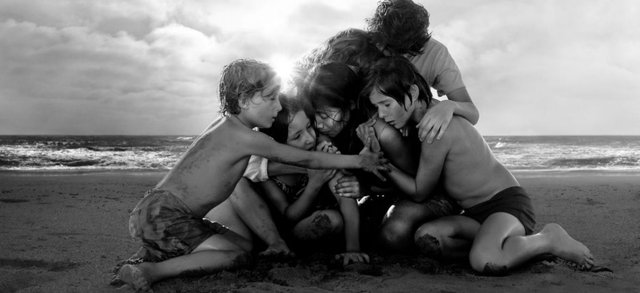
I will not hide. I approached "Roma" carefully. For many reasons. At the beginning it seemed to me that I should obligatorily watch a movie at the cinema (there are shows, although the production is mainly available on Netflix). Then I was not sure if I would miss some of the contexts of this Mexican drama set in the seventies. However, when I broke it turned out that, as usually happens with great cinema. If it hits you, it hits absolutely. And "Roma" is a great cinema.
At the very beginning it is worth noting that to feel a little better in the world created by the director, it is worth spending about half an hour to read what was happening in Mexico between 1970 and 1971. This is not absolutely mandatory, but Cuarón in his film takes the perspective of a person who shows private stories, at times in which the politics and history of the country and nation is intertwined with the life of the heroine. The information we hear on the radio, the political slogans appearing in the background, memories of paramilitary organizations, and finally - the absolutely ingenious scene of the police and students' clashes that ended with the massacre of the civilian population. For the lives of the protagonists, these are not key events, but like the wide shots of the city's, they create a space in which a completely private story takes place. Cuarón decided on a step that often escapes other creators - who assume that life in times of political unrest is dominated by them. Meanwhile, with the Mexican director, politics or social unrest are next to the family drama - they really intersect in one place, where suddenly, the traffic on the street becomes the point where the private and the political life are connected.
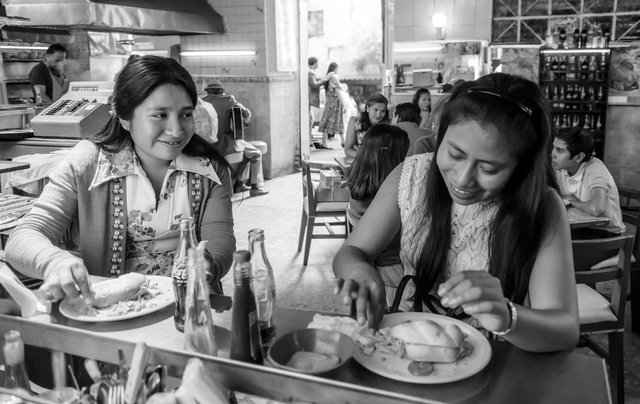
History itself focuses on one year in the life of Cleo - girl from a small village somewhere in central Mexico, she is a servant in a wealthy home in the eponymous Roma district. The girl, clearly of indigenous origin, is a quiet and peaceful, although her position in the family is not completely unambiguous. You can see that the bond she has with children far exceeds the "professional" relationship. Cleo loves children, clearly having the greatest weakness for the youngest of four siblings. Her relationship with the lady of the house and her mother is quite well arranged. Although there is a lot of warmth and genuine care in these relations, at the same time the mother of the lady of the house is watching if the girl does not keep the light in her servant too long. The peaceful life of the family changes when, Sofia's husband (the lady of the house) decides to leave, violating the calm of the heroines. Interestingly - despite the fact that in the film, the departure of her husband, or the unexpected pregnancy of Cleo, are key themes, at the same time - it is almost a production without men. Cuarón focuses on women's experience, putting men just in the background.
The film has an episodic structure, which primarily allows you to enter the world of heroes and look not only at their home life, but also to Mexico itself - lively, agitated but above all - incredibly diverse. Cuarón shows us both a peaceful and prosperous life of a wealthy family - where the biggest problem seems to be parked of a wide car into a relatively narrow gate, as well as living in slums where there are no sidewalks, water, and a well-placed home. He takes us to a great estate, where wealthy families celebrate the new year, and then move us to a nearby village, where the local people are playing equally well, though not so richly. At the same time, what must be admitted to the director - showing the differences in social relations, class divisions, reminding political tensions, he does so gently and subtly that he does not lose sight of interpersonal relations. This is best seen in the example of Cleo's relationship with the family she serves. There is realy concern in their relationships - when a girl gets pregnant, they will help her find a good doctor or choose a cradle. But at the same time - it is still a maid whose job is to collect dirty bedding and prepare breakfast. Showing the multidimensionality of these relationships makes the film even more realistic than the very well reflected realities of the era.
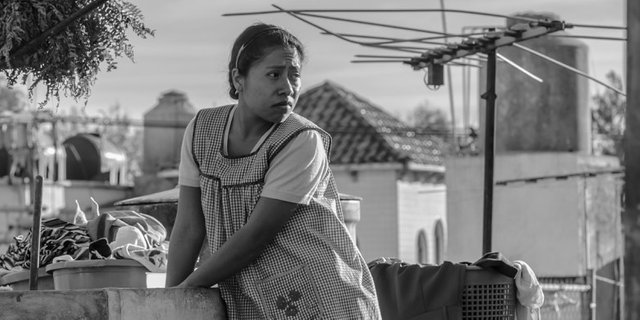
Cuaron does not avoid emotions in his film. And you can not hide - showing emotions comes out on the screen phenomenally. This should not be a novelty, after all, the director has done so many times, but I must admit that here - perhaps thanks to the fact that we meet the heroes in a slow, episodic narrative - their emotions become much more important to us. Although there are many moving private moments in the film, it is probably the biggest impression, the massacre of students is being watched through the window of the furniture store. The perspective adopted by the director - makes the viewer who knows what will happen feel tense, the viewer who does not know the history of Mexico may feel equally shocked and surprised by the characters themselves. No less a juxtaposition of these ordinary purchases in a department store, with the out of the window unexpected massacre (shot more emotionally than shocking photos) makes a much bigger impression than such stressful scenes, in which the viewer for a quarter of an hour knows that it will be on the the screen was played by a great historical event. At the same time - Cuarón combines this emotion resulting from observing history, with completely private moments. I admit that especially at the end - when he shows Cleo experiencing a very ambivalent approach to her tragedy, I had the feeling that he managed to do something rare - touching some truly feminine experience that touches not emotionally created but its truth. Emotion is the result of seeing life rather than the film narrative itself.
That said - Cuarón went rare. He made a black-and-white film, with a very episodic structure, drawing a bit from the New Wave tradition, a bit of neo-realism, and for a moment there is no impression of pretentiousness. On the contrary - there is something in ”Roma” that makes you quickly enter the world of heroes, follows them in their everyday life, which in some ways is simply pleasant. As we know, this is to a large extent an autobiographical film and there is a bit of a narrative reminiscent of memories. Scenes that seem unspoken at first glance, find their context over time. However, this does not change the fact that this quite long, over two-hour movie simply looks fantastic. What is not necessarily always can be said about films that aspire to be more artistic and less entertaining. I'm not saying that a movie with ambitions is boring in principle, but sometimes it requires a lot more patience from the viewer. Meanwhile, "Roma" looks great.
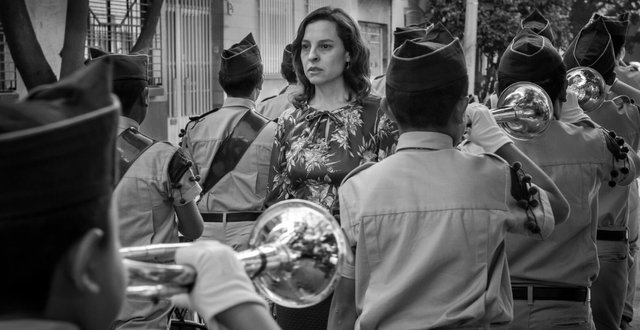
The director was extremely lucky, that he was able to spot Yalitze Aparicio - this unprofessional actress who plays Cleo is largely responsible for the success of the film. It is her calm expression, fantastic showing of emotions and, above all, the immediate presence of the girl, which makes her needless to say in a film so that we can guess the entire spectrum of the heroine's emotions. Especially in the second half of the film, in which the heroine is pregnant - her small gestures, or looks allow us to understand what is happening inside Cleo, even if it is a character tight-lipped. This is an excellent role because it is subtle, moving but not overreached. I can not imagine that many unprofessional actors would be able to play the character so gently and perfectly, which we know and love so much at the end of the movie that we do not necessarily want them to disappear from our field of view.
From time to time, Cuarón in film suggests that we do not really see history in any way unique. When Cleo making laundry on the roof of the house, we can see on the roofs of the houses around, other servants, other families. Families who, as you can surmise, also experience their tragedies, only sometimes noting that they serve to witness their private problems, and the life of state and service permeates in a way that can not be unambiguously solved. Anyway, it must be admitted that there are a few marvelous, fascinating sequences in this movie - like almost surgical adjustment of a car to a narrow entrance gate, a sequence in which a young boy shows off his skills in a bedroom in front of a girl whom he learned during fighting classes or a wonderful opening scene in which the heroine washes the pavement (this is a marvelous scene that shows how much you can do in the film, really doing very little). The film is full of such small wonders, which are watched with the greatest pleasure. And not all of them are dead serious, because the film finds its humor, absurdity or just not necessarily horribly serious everyday life.
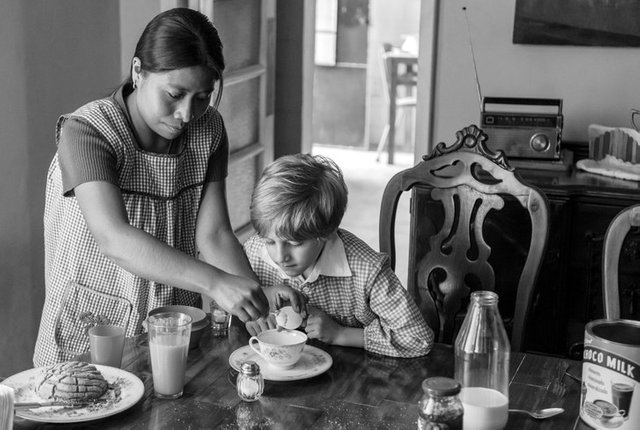
Of course, the title of the film - Roma refers to the district in which the whole story takes place. It is impossible to wonder whether the situation shown - growing social tensions, calm, affluent middle class, largely ignoring what is happening in other districts of the city, in the end, the fact that the state separates servants not only from wealth but also from origin (in fact, all the servants come from the village and are of indigenous origin) - it does not resemble such a symbolic Rome before the fall. Especially that between 1970 and 1971 changes started in Mexico, which were then followed by enormous repercussions - a new president came to power, there was a riot, people started to take over the land (the dispute about land appears in the background of history), new big projects appeared, oil fields were discovered near the ocean shore. It all changed Mexico. But here we are watching the world on the verge of these changes, where it feels like around a safe, private world of the inhabitants of a wealthy, colonial neighborhood. Still, the world behind the glass gate is a tidy and stable space, and only any changes occur in it towards the end of the story, telling the characters to come to terms with the fact that everything will be different. Both in this public and private dimension of their lives.
Regardless of the discussion about how the appearance of the film in many countries only on Netflix, it will affect its perception (there is no doubt that it is a fantastic movie to watch in the cinema - with its wide shots, and perfect use of black and white tape - though probably no tape was there) I am extremely happy that I could see Roma without leaving home. It is about such a simple fact that sometimes I prefer to see such moving private stories at home. You know, sometimes you wants to sniff in loneliness. And with "Roma" it's easy to cry a little.
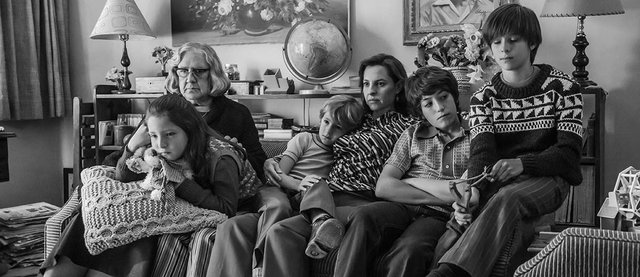
I really like when the creators send the characters to the cinema for films that I can recognize. What's more, the film has a few scenes that take place in the cinema - I have the impression that Caurón shows us afilms on which he grew up. This is the moment of the film in which it feels like the creator did not so much let us into the world of heroes as to his own memories.
Great review. I watched the movie and loved it. My daughters did not want to watch it because an aunt of theirs told them it was a very bad movie, hard to understand, slow and boring.
It is really unfortunate that we don't have more movies like this one in every movie season. Our youth are growing up with a very simplistic notion of what cinema and a quality cinematic product is.
Roma is beautiful in every frame, every shot, every dialogue. It challenges the audience's attention and it makes us focus on details.
As in a poem, every piece counts, every element has been carefully chosen for dramatic effect and to move the story along, while creating ramifications.
I would add that men are actually important in as much as they represent everything that is wrong with this world. They fuck things up big time; they disrrupt what may otherwise be a beautiful and harmonious world.
There lies the importance of childhood and there lies the importance of parenthood. Children have the potential to create or destroy depending on how they are raised and what constitutes their living records or emotional registers.
Yes, this movie is amazing, and as you write its a pity that we don't have a lot of movie like this in a mainstream. At least we can always find something in independent cinema.
Posted using Partiko iOS
Hi anaerwu,
Visit curiesteem.com or join the Curie Discord community to learn more.
Seems like an emotional movie to watvh with the family, will keep up with the history of mexico and watch the movie
Posted using Partiko Android
Yes it's emotional and history is slowly so for someone it could be boring but the photos and music is amazing.
Posted using Partiko iOS